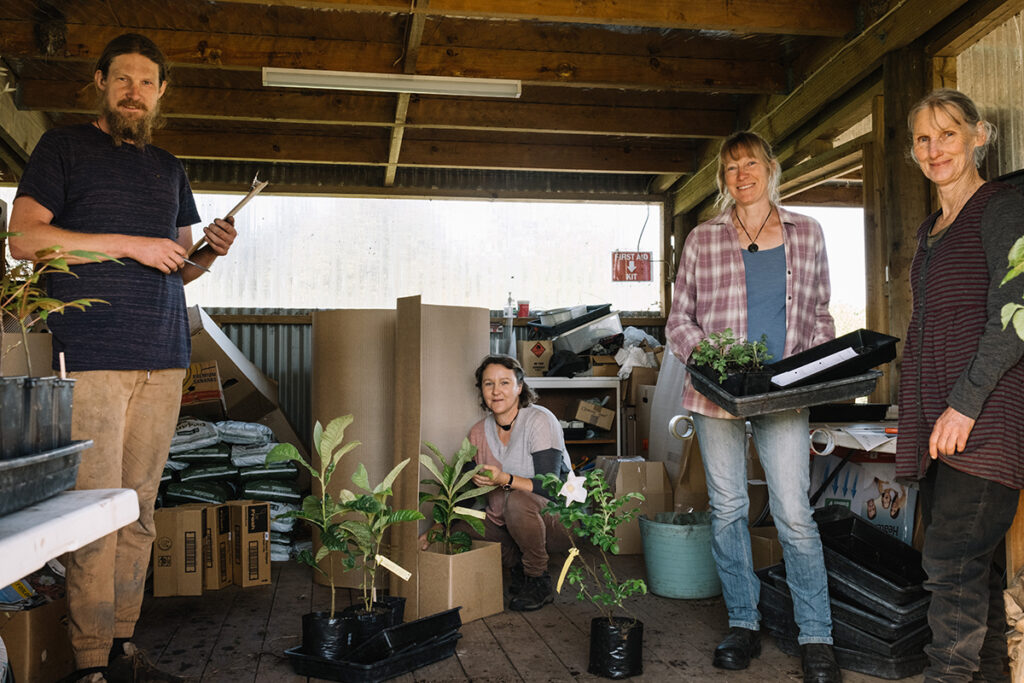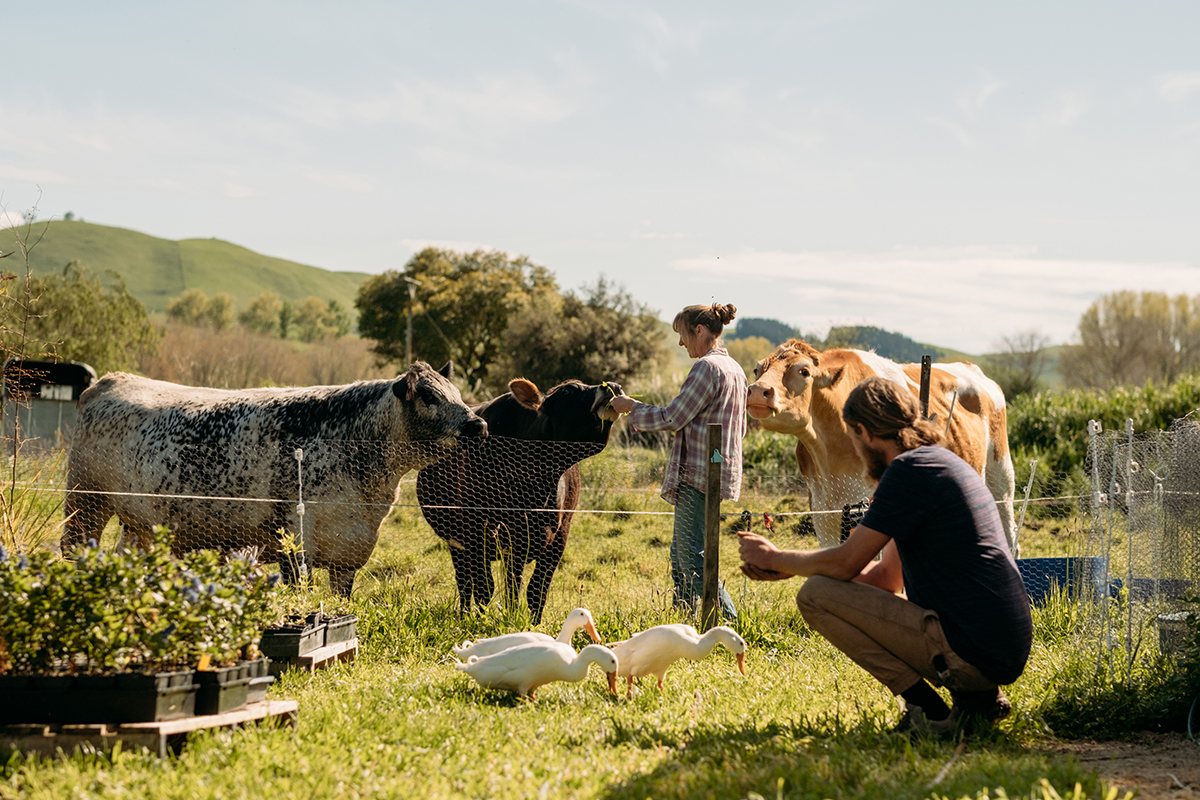Jo and Aaron Duff have created a way of life that is sustainable, resilient and regenerative.
The passion for permaculture drives everything that Jo and Aaron Duff do on their farm in Poukawa. Kahikatea Farm is their life and they tread lightly on the land. As kaitiaki of this place they apply the principles of “Earth care, people care and fair share,” making a living and sharing their knowledge with others.
Aaron and Jo bought this block of fenced farming land on Te Mahanga Road Poukawa in 2005, its sixteen acres spread wide over a hill, surrounded by fertile low-lying farmland. These rich, productive lands were originally wetlands with magnificent stands of kahikatea that stretched from Lake Poukawa to the Peka Peka wetlands and the farm’s name acknowledges that history.
On the mild and sunny September day that I came here the valley was velvety green and beautiful. The last time I visited Jo and Aaron was in 2009, when they were still developing their organic farm on permaculture principles, industriously planting trees, establishing a kitchen garden, constructing growing houses for the plant nursery and digging swales.
They had recently been blessed with their first child, Anna, then a baby of three months. The site was exposed to the biting winds from the south and west, and the couple were living with their baby in a humble caravan and a burning ambition to make their permaculture dreams a reality.
My recent visit was in extraordinary contrast. Their hill was covered in trees, shelterbelts of pines and eucalypts reaching high above my car as it wound up the drive. Arriving at their cottage I peered through a screen of flowering medicinal and food foraging plants to be met by their three enthusiastic canines, and Jo emerged to greet me.

She took me to the plant nursery, and I was struck by the many tunnel houses where their plants and herbs are propagated and by the sheer variety of species (over four hundred). We then walked through the maturing food forest with its microclimates of sheltered spaces, past the small, lush grass paddocks where their three white Galloway-cross cattle graze.
Permaculture is a system of conscious design that mimics the patterns and relationships of nature to provide for human needs for food and labor-saving systems. The term ‘permaculture’ was first coined in 1978 by Bill Mollison and David Holmgren and is a positive response to the environmental and social challenges of our time.
Everything is connected
Relationships form an important component of permaculture thinking – everything in natural systems is functionally connected, from humans to soil microbes to trees, to the hydrological cycle. Relationships with customers, visitors and workshop attendees provide opportunities to learn and share knowledge.
Jo is the lynchpin of the farm – nursery and office manager, teacher, plant specialist, marketer, mother and wife of Aaron. A debilitating back injury in 2011 prevents Aaron from doing physical work on the farm – it was a serious setback, but they have learned to live with this reality. They are partners in the enterprise: “But,” says Jo, “luckily, he has enjoyed the opportunity to be ‘house daddy’ to our two daughters, Anna and Eliza. He also does the finances, which involves making me define more clearly what is a ‘want’ and what is a ‘need,’ as I am always wanting to explore new plant varieties.”
The myriad tasks are shared with their colleague and friend, Gigs – the carpenter, fencer, tree pruner and all-round skilled right-hand man and with Kiwi/Argentine couple Bride and Berna, who live on-site while building their tiny home. In the nursery four part-time workers are employed at the height of the season propagating, potting up plants and preparing orders for delivery.
The plant nursery is impressive. Here they specialise in perennial food plants, culinary and medicinal herbs (possibly the largest range in the country), dye plants, pollinator attractors, lesser-known nut and fruit trees, plus natives for on-farm planting. It’s the income earner for Kahikatea Farm, as are the deeply satisfying educational courses. Horticultural students from EIT visit Kahikatea Farm to learn about the principles and reality of permaculture growing.
Naturally – due to the plants being certified organic – Cornucopia in Hastings was an early supporter of their project and has always stocked their plants out front on Heretaunga Street. Interest has grown and now their Kahikatea Farm website generates 90 percent of their orders from all over the country. Some informative relationships have developed through the ethno-botanic preferences of customers with origins in China, Japan and elsewhere, providing Jo with insights into alternative varieties to grow and the ways they are used.

The seasonal demands on Jo’s time are many and varied, and she follows a strict regime to manage the many seasonal tasks requiring her attention. Jo’s favourite project is the Food Forest – a perennial food system that lies on the east and north facing slopes and she yearns to spend more time there growing the diverse and complementary mix of plants (a permaculture principle) that ensures greater biodiversity, soil health and food resilience.
Through it runs the swales, the on-contour ditches that capture rain otherwise lost through run-off, it percolates into the soil, tree roots and understory of perennial vegetable plants that provide forage for the meal table. Plants are chosen to fit the permaculture ethos of being multifunctional and perennial as a one-off planting for a long-term harvest requires less work and less soil disturbance than annuals.
In the beautifully sheltered bowl of land below the food forest is a place of play and recreation, somewhere to celebrate the summer evenings when the work is done. There’s a cute wattle and daub hut for summer sleepouts that their girls have helped them build and a bar-cum-kitchen for serving the drinks and picnics enjoyed with friends and visitors. The Duff family don’t take holidays away from home and it is here, near the clear water pond (water-storage) and the magnificent views towards the hills, that they take their breaks from the constant demands of work.
Through the arc of seventeen years they have slowly and methodically created shelter from the high winds and built a home and farm buildings. Using permaculture principles, they have planned and developed all their growing systems. The soil fertility is restored and the land has been productively planted. Most importantly, they can be satisfied that they have fulfilled their intention to create a way of life that is sustainable, resilient and regenerative.

While this past winter has been difficult with Covid filtering through the family and workforce, and record rainfall making the land wet and boggy, Jo says if they are ever having a bad day, they look out on what they have created on the land and know they are so lucky to be doing what they are doing.
There are many goals yet to be achieved and they will happen. Just the time frame is uncertain. Some projects will fail and be replaced with other exploratory projects and they are always learning. Permaculture represents a lifetime of holistic engagement with nature, a life of great personal significance to Jo and Aaron Duff and the team at Kahikatea Farm.
Follow Kahikatea Farm on Facebook and Instagram


Dear Jo and Aaron,
What a wonderful work. You’re an inspiration.
Thank you.
You’re trail blazers Jo and Aaron. In the dominant world culture, we seek certainty and predictability when in fact there is only constant change and learn that there’s Widom in Vulnerability. Love seeing your exploration and experimentation.